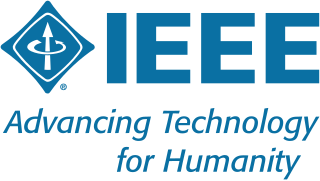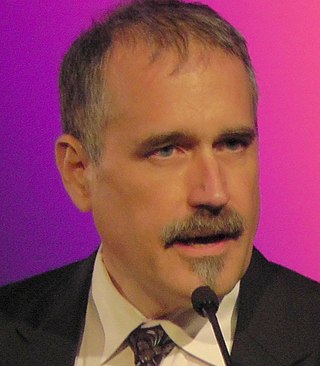
Frederick Phillips Brooks Jr. was an American computer architect, software engineer, and computer scientist, best known for managing the development of IBM's System/360 family of computers and the OS/360 software support package, then later writing candidly about those experiences in his seminal book The Mythical Man-Month.

The Institute of Electrical and Electronics Engineers (IEEE) is a 501(c)(3) professional association for electronics engineering, electrical engineering, and other related disciplines with its corporate office in New York City and its operations center in Piscataway, New Jersey. The IEEE was formed from the amalgamation of the American Institute of Electrical Engineers and the Institute of Radio Engineers in 1963.
A Bachelor of Engineering (BE or BEngg) or a Bachelor of Science in Engineering (BSc (Engg) or BSE) is an undergraduate academic degree awarded to a student after three to five years of studying engineering at an accredited college or university.

Kakatiya Institute of Technology & Science (KITSW) is an autonomous college in Warangal district of Telangana in India. It was established in 1980.It is one of the top private Engineering Colleges in the state of Telangana.The college allows undergraduate students through the statewide EAMCET & JEE exam conducted every year. It offers the Bachelor and masters in Engineering and MBA courses.

Charles LeGeyt Fortescue (1876–1936) was an electrical engineer. He was born in York Factory, in what is now Manitoba where the Hayes River enters Hudson Bay. He was the son of a Hudson's Bay Company fur trading factor and was among the first graduates of the Queen's University electrical engineering program in 1898.
Alan Victor Oppenheim is a professor of engineering at MIT's Department of Electrical Engineering and Computer Science. He is also a principal investigator in MIT's Research Laboratory of Electronics (RLE), at the Digital Signal Processing Group.

Electrical/Electronics engineering technology (EET) is an engineering technology field that implements and applies the principles of electrical engineering. Like electrical engineering, EET deals with the "design, application, installation, manufacturing, operation or maintenance of electrical/electronic(s) systems." However, EET is a specialized discipline that has more focus on application, theory, and applied design, and implementation, while electrical engineering may focus more of a generalized emphasis on theory and conceptual design. Electrical/Electronic engineering technology is the largest branch of engineering technology and includes a diverse range of sub-disciplines, such as applied design, electronics, embedded systems, control systems, instrumentation, telecommunications, and power systems.
Raj Kumar Goel Institute of Technology (RKGIT), is a private college in Ghaziabad, India. It is affiliated to Dr. A.P.J. Abdul Kalam Technical University.
Lalbhai Dalpatbhai College of Engineering, is a state college located in Ahmedabad, Gujarat, India.

Alan Conrad Bovik is an American engineer, vision scientist, and educator. He is a professor at the University of Texas at Austin (UT-Austin), where he holds the Cockrell Family Regents Endowed Chair in the Cockrell School of Engineering and is Director of the Laboratory for Image and Video Engineering (LIVE). He is a faculty member in the UT-Austin Department of Electrical and Computer Engineering, the Machine Learning Laboratory, the Institute for Neuroscience, and the Wireless Networking and Communications Group.

The Government College of Engineering Karunagappally (CEK) is a public institute of engineering and technology in Karunagappally, in the north-west of Kollam district, Kerala, India. Established in 1999 by the Government of Kerala, it is the second engineering college in Kollam district the fourth engineering college under the aegis of the state government's Institute of Human Resources Development in Electronics. The institute is affiliated to the A P J Abdul Kalam Technological University, Recognized by AICTE and Accredited by National Board of Accreditation(NBA). It is the second engineering College in the Kerala Section to win the prestigious IEEE Region 10(Asia - Pacific) Exemplary Student Branch Award, Only student branch in Asia Pacific Region to win the IEEE MGA Regional Exemplary Student Branch Award twice in a row.

Electronic engineering is a sub-discipline of electrical engineering which emerged in the early 20th century and is distinguished by the additional use of active components such as semiconductor devices to amplify and control electric current flow. Previously electrical engineering only used passive devices such as mechanical switches, resistors, inductors, and capacitors.
Chen Wen-tsuen is an ethnic Taiwanese computer scientist, a distinguished research fellow at the Academia Sinica and a lifelong national chair of the Ministry of Education, Taiwan. From 2006 to 2010, he was the president of the National Tsing Hua University, a premier research university in Taiwan.

Kenneth C. Smith is a Canadian electrical engineer and professor. He is currently Professor Emeritus, University of Toronto.

John Makhoul is a Lebanese-American computer scientist who works in the field of speech and language processing. Dr. Makhoul's work on linear predictive coding was used in the establishment of the Network Voice Protocol, which enabled the transmission of speech signals over the ARPANET. Makhoul is recognized in the field for his vital role in the areas of speech and language processing, including speech analysis, speech coding, speech recognition and speech understanding. He has made a number of significant contributions to the mathematical modeling of speech signals, including his work on linear prediction, and vector quantization. His patented work on the direct application of speech recognition techniques for accurate, language-independent optical character recognition (OCR) has had a dramatic impact on the ability to create OCR systems in multiple languages relatively quickly.

Moeness G. Amin is an Egyptian-American professor and engineer. Amin is the director of the Center for Advanced Communications and a professor in the Department of Electrical and Computer Engineering at Villanova University.

Khanh Dai Pham is a Vietnamese-born American aerospace engineer. He is noted for his work in statistical optimal control theory, game-theoretic operations research of military satellite communications, space control autonomy, and space domain awareness and the government leadership in innovation ecosystem and coalition of government agencies, small business and industry. He is a Fellow of the Air Force Research Laboratory (AFRL), the National Academy of Inventors (NAI), the Institution of Engineering and Technology (IET), the Society of Photo-Optical Instrumentation Engineers (SPIE), the Royal Aeronautical Society (RAeS), the International Association for the Advancement of Space Safety (IAASS), and the Royal Astronomical Society (RAS). He is not only a Fellow of the Institute of Electrical and Electronics Engineers (IEEE), the American Astronautical Society (AAS), and the Asia-Pacific Artificial Intelligence Association (AAIA) but also an Associate Fellow of the American Institute of Aeronautics and Astronautics (AIAA) and the Royal Institute of Navigation (RIN).
Monica Blank is an American electrical engineer whose research focuses on gyrotrons and their use in generating millimeter-wave radiation for applications including radar and nuclear magnetic resonance. She works for Communications & Power Industries in the San Francisco Bay Area.











